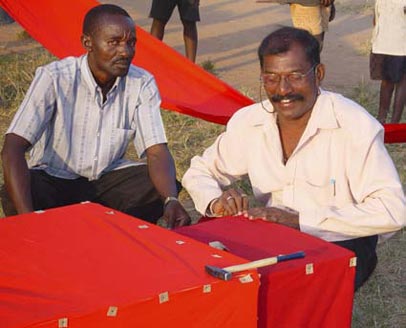Casestudy 24Shack Dwellers International
Learning through community exchange
- description
- further information

© Homeless International
This case study considers the experience of national urban poor federations and their support NGOs that make up the international network of Shack or Slum Dwellers International (SDI) for learning and knowledge sharing between communities.
Each member federation is made up of local community organizations carrying out savings schemes in which women play a key role. The primary goal of the federations is to develop the capacities of urban poor communities so that they build strong organizations that can articulate needs and aspirations, have the capacity and confidence to design and manage solutions that can be scaled up and seek to participate in development activities as partners rather than as beneficiaries. To this end, they have developed a set of tools exchanged between communities for ‘peer learning’. This consists of members from different communities within a city, a country or internationally visiting each other to meet and exchange ideas, experiences and the methods they have developed over time.
Community exchanges serve many purposes. They spread ‘knowledge capital’ built on the urban poor communities’ own experiences – for instance, how to set up saving schemes, how to give and manage loans, how to collect and manage household and housing data, and how to manage land, building and relations with local authorities. Community exchanges are also a means of drawing large numbers of people into a process of change, supporting local reflection and analysis, enabling the urban poor to own the process of knowledge creation and providing a catalyst for taking their actions and learning process a step forward. Exchanges enable the poor to reach out and federate, thereby developing a collective vision and collective strength. They help create strong personal bonds between communities that share common problems, both presenting them with a range of options to choose from and negotiate for and assuring them that they are not alone in their struggle. Through interaction with their peers and a better understanding of the process of change that has taken place in other settlements, community leaders learn to position themselves as drivers within larger scale development processes. Finally, they are a way to influence the professionals and members of governments who get invited to join in these community exchanges. This opens space for negotiation and encourages other actors involved in urban development to adjust their perspectives of the poor and consider the innovations and experimentation that they have undertaken. By expanding exchanges between urban poor organizations to the international level, the SDI network also seeks to demonstrate to international agencies the learning that these community exchanges produce.
A community exchange in Namibia, with participants from the South African and Zimbabwean federations, illustrates the learning produced by the experience for each party. For the South Africans, it was a chance to explore in more detail the policy of incremental infrastructure development in Windhoek that had developed from a partnership between the Namibian federation and the city authorities. For the Zimbabweans, it was a way of spreading a better understanding of the policy of incremental development within their federation and with their support NGO (Dialogue on Shelters). It also proved an opportunity to explore appropriate professional support strategies within the group. For the Namibians, it offered an opportunity to assess the technical strengths and weaknesses of their work in installing infrastructure. The federations also gained more information on how their work was perceived and what might usefully be addressed.
Central to the concept of learning through community exchange is the recognition that most community members who have not gone through a formal education system have very different ways of collecting and synthesizing knowledge. They learn through real life experiences what works and what does not and have collective wisdom, rather than written documents, seminars and educational meetings organized by professionals. The knowledge that people, especially the very poor, have created forms the basis of their survival strategies. By enabling communities to share and explore such knowledge, the poor get to realize that they can help play a definitive role in development processes. As the links between communities become stronger and as more people experiment with this new learning, ideas are refined and put into practice, use is scaled-up and replication and adaptation take place.
A condition for community exchanges to be successful is that communities undertaking exchanges are linked together in a network or federation. This ensures that the solutions that are explored and elaborated are those that emerge from the communities’ own experience in addressing poverty and that make sense to a large number of urban poor communities with the potential to be embedded in community practice and scaled-up. Leadership is another important factor, as it is the regional and national leaders that keep in touch with the many communities that participate in the process and ensures that communities are organized and mobilized so as to be able to exert political influence. Finally, it is important that there remains very little or no professional intervention in the community learning process. The poor are much more committed to the solutions – even if they take a very long time – if they see that change is possible using their own strategies and processes and is aimed at priorities they have set themselves.Go back to case studies listing
D’Cruz, C. and Mitlin, D. (n.d.) Shack/Slum Dwellers International: One Experience of the Contribution of Membership Organizations to Pro-poor Urban Development, International Institute for Environment and Development (IIED), Institute for Development Policy and Management (IDPM) University of Manchester, downloadable from the IIED website:
Patel, S., Bolnick, J. and Mitlin, D. (n.d.) Sharing Experiences and Changing Lives, document downloadable:
